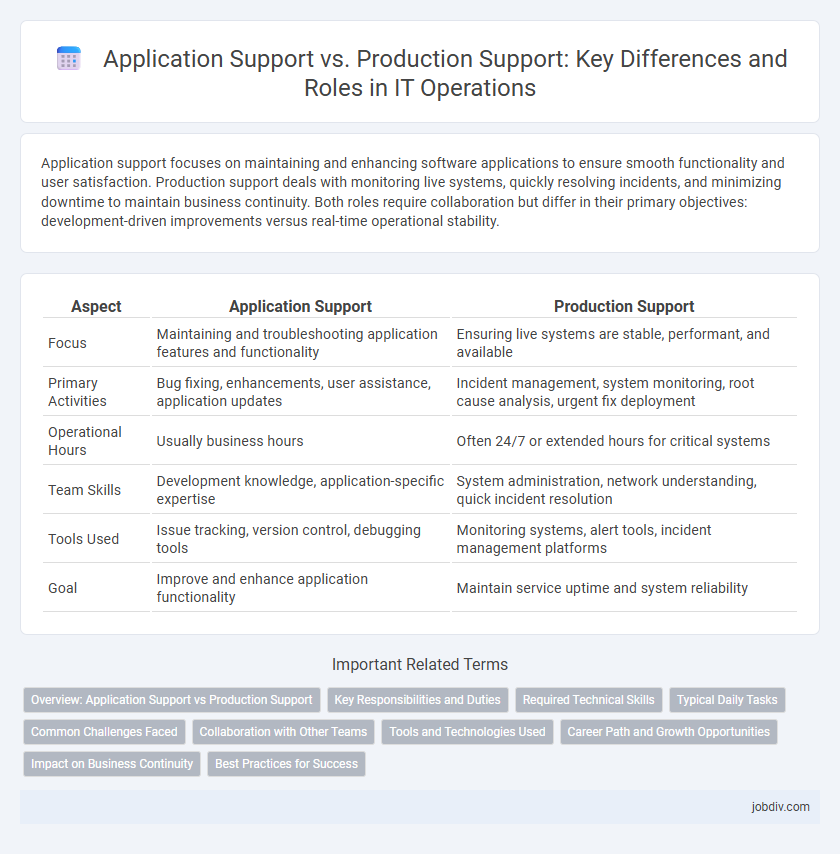Application support focuses on maintaining and enhancing software applications to ensure smooth functionality and user satisfaction. Production support deals with monitoring live systems, quickly resolving incidents, and minimizing downtime to maintain business continuity. Both roles require collaboration but differ in their primary objectives: development-driven improvements versus real-time operational stability.
Table of Comparison
| Aspect | Application Support | Production Support |
|---|---|---|
| Focus | Maintaining and troubleshooting application features and functionality | Ensuring live systems are stable, performant, and available |
| Primary Activities | Bug fixing, enhancements, user assistance, application updates | Incident management, system monitoring, root cause analysis, urgent fix deployment |
| Operational Hours | Usually business hours | Often 24/7 or extended hours for critical systems |
| Team Skills | Development knowledge, application-specific expertise | System administration, network understanding, quick incident resolution |
| Tools Used | Issue tracking, version control, debugging tools | Monitoring systems, alert tools, incident management platforms |
| Goal | Improve and enhance application functionality | Maintain service uptime and system reliability |
Overview: Application Support vs Production Support
Application Support focuses on resolving issues related to software applications, including bug fixes, user queries, and software updates, ensuring optimal application performance. Production Support handles the stability and availability of IT systems and infrastructure, addressing incidents and outages that affect live environments and business continuity. Both roles are critical for seamless IT operations, with Application Support emphasizing application health and Production Support prioritizing overall system reliability.
Key Responsibilities and Duties
Application Support primarily involves monitoring and maintaining software applications to ensure optimal performance, handling user issues, and implementing updates or patches. Production Support focuses on managing live system environments, resolving system outages, analyzing root causes of incidents, and coordinating with development teams to deliver timely fixes. Both roles require strong problem-solving skills, effective communication, and continuous process improvement to minimize downtime and enhance user satisfaction.
Required Technical Skills
Application Support requires expertise in software troubleshooting, understanding of application architecture, and proficiency in SQL for database queries. Production Support demands strong skills in monitoring tools, incident management, and knowledge of server environments to ensure system stability. Both roles necessitate effective communication skills for collaboration across development and operations teams.
Typical Daily Tasks
Application Support typically handles issue resolution related to software functionality, performing routine health checks, managing user requests, and coordinating with development teams for bug fixes and feature enhancements. Production Support focuses on monitoring live environments for system performance, executing incident management procedures, resolving critical outages, and ensuring uptime through proactive maintenance. Both roles require detailed logging, communication with stakeholders, and adherence to service level agreements (SLAs) to maintain operational stability.
Common Challenges Faced
Application Support and Production Support commonly face challenges such as incident management inefficiencies, inadequate root cause analysis, and communication gaps between development and operations teams. Both require timely issue resolution and continuous monitoring to maintain service availability and performance. Resource constraints and evolving technology stacks further complicate maintaining consistent support quality.
Collaboration with Other Teams
Application Support teams collaborate closely with development and QA teams to resolve defects and deploy updates efficiently, ensuring minimal disruption to users. Production Support focuses on working with infrastructure, network, and database teams to monitor system health and quickly address outages or performance issues. Effective cross-team communication between Application and Production Support is critical for maintaining system stability and accelerating incident resolution.
Tools and Technologies Used
Application Support primarily utilizes monitoring tools such as AppDynamics, Dynatrace, and Splunk to track application performance and quickly identify issues. Production Support relies on incident management platforms like ServiceNow and Jira to manage and resolve live system incidents, alongside log analysis tools such as ELK Stack or Graylog for troubleshooting. Both support types often integrate automation frameworks like Ansible or Puppet to streamline deployments and patch management within the support lifecycle.
Career Path and Growth Opportunities
Application Support roles emphasize deep technical expertise in specific software systems and provide career growth through specialization, certification, and movements into roles like Business Analyst or Solution Architect. Production Support careers focus on operational stability, incident management, and cross-functional coordination, offering growth pathways into IT Service Management, Site Reliability Engineering, or DevOps roles. Both paths enhance problem-solving and technical skills but diverge in focus, with Application Support favoring development-oriented advancement and Production Support emphasizing infrastructure and process optimization.
Impact on Business Continuity
Application Support ensures seamless software functionality and timely issue resolution, minimizing downtime and enhancing user satisfaction. Production Support addresses real-time system failures and urgent incidents, directly preventing service disruptions and safeguarding critical business operations. Both support types are vital for maintaining business continuity by reducing operational risks and ensuring consistent performance.
Best Practices for Success
Application Support focuses on proactive monitoring, timely incident resolution, and continuous improvement of software applications to ensure optimal performance and user satisfaction. Production Support emphasizes stabilizing live environments by quickly addressing critical issues, managing change control, and maintaining system availability and reliability. Combining structured communication channels, comprehensive documentation, and collaboration between teams drives best practices for success in both application and production support domains.
Application Support vs Production Support Infographic

 jobdiv.com
jobdiv.com